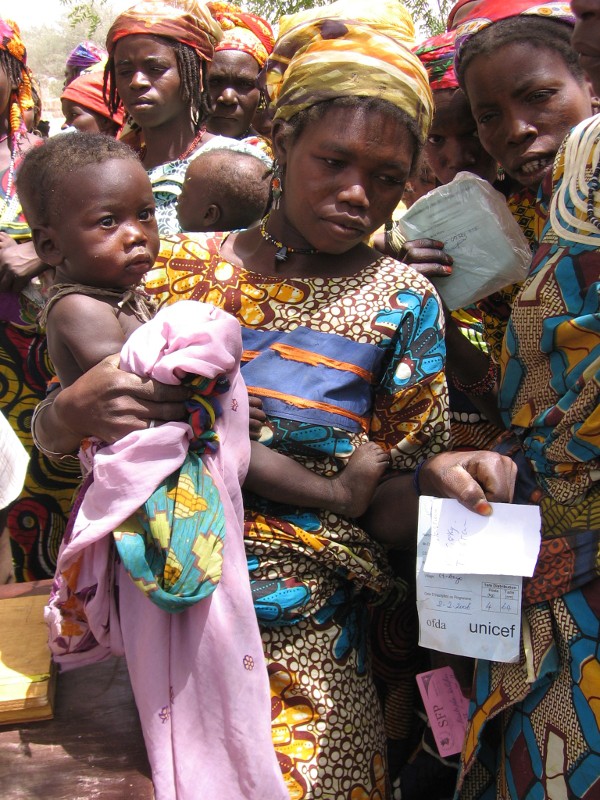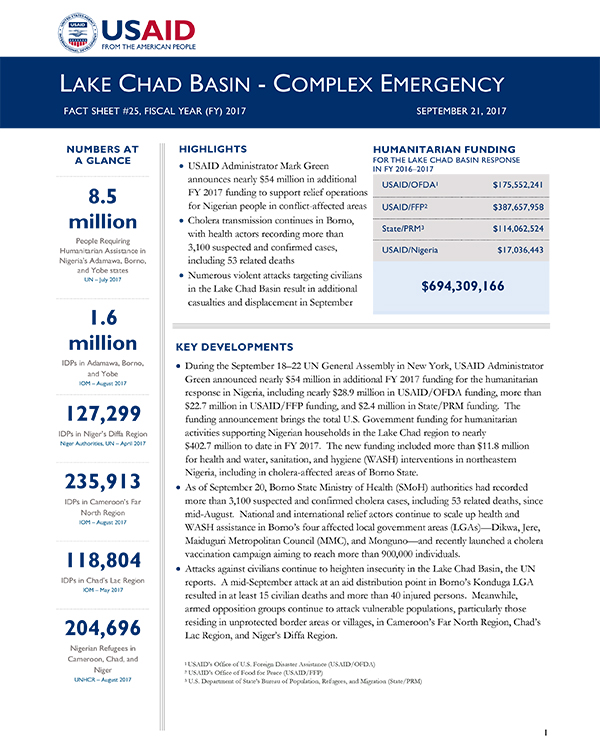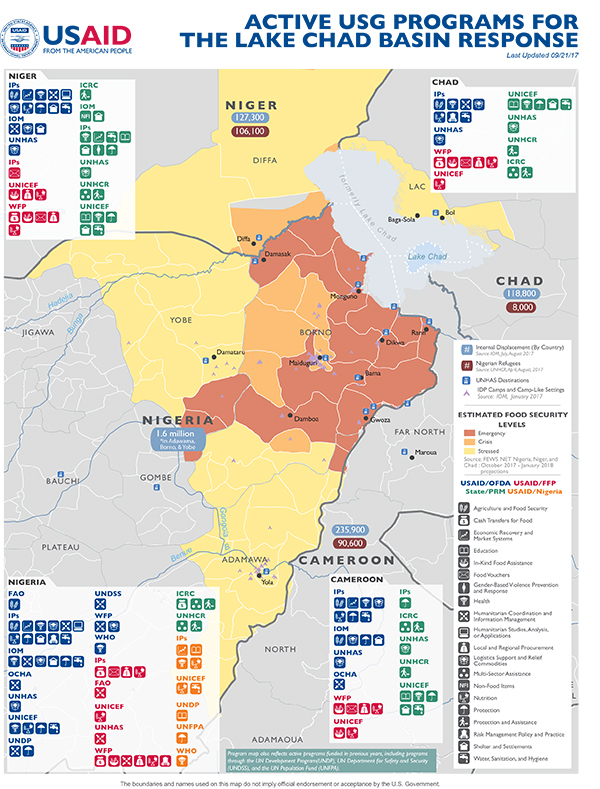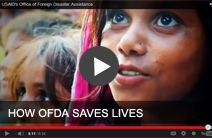- What We Do
- Agriculture and Food Security
- Democracy, Human Rights and Governance
- Economic Growth and Trade
- Education
- Ending Extreme Poverty
- Environment and Global Climate Change
- Gender Equality and Women's Empowerment
- Global Health
- Water and Sanitation
- Working in Crises and Conflict
- Disaster Assistance
- Political Transition Initiatives
- Conflict Mitigation and Prevention
- Countering Violent Extremism
- Disaster Risk Reduction
- Peacebuilding and Reconciliation
- Providing Safe & Secure Environments for Development
- Recovering From Crisis
- Resilience
- Tech Challenge for Atrocity Prevention
- World Humanitarian Day
- U.S. Global Development Lab

Key Developments
USAID's Office of U.S. Foreign Disaster Assistance (USAID/OFDA) is responding to the complex emergency in the Lake Chad Basin region, including Nigeria, Cameroon, Chad, and Niger.
During the September 18–22 UN General Assembly in New York, USAID Administrator Green announced nearly $54 million in additional FY 2017 funding for the humanitarian response in Nigeria, including nearly $28.9 million in USAID’s Office of U.S. Foreign Disaster Assistance funding, more than $22.7 million in USAID’s Office of Food for Peace funding, and $2.4 million in U.S. Department of State’s Bureau of Population, Refugees, and Migration funding. The funding announcement brings the total U.S. government funding for humanitarian activities supporting Nigerian households in the Lake Chad region to nearly $402.7 million to date in FY 2017. The new funding included more than $11.8 million for health and water, sanitation, and hygiene (WASH) interventions in northeastern Nigeria, including in cholera-affected areas of Borno State.
As of September 20, Borno State Ministry of Health authorities had recorded more than 3,100 suspected and confirmed cholera cases, including 53 related deaths, since mid-August. National and international relief actors continue to scale up health and WASH assistance in Borno’s four affected local government areas (LGAs)—Dikwa, Jere, Maiduguri Metropolitan Council, and Monguno—and recently launched a cholera vaccination campaign aiming to reach more than 900,000 individuals.
The UN recorded nearly 30 incidents of violence against civilians in the Lake Chad Basin in August, representing the highest monthly figure reported since January 2016. In Nigeria, two unidentified adult females carrying person-borne improved explosive devices detonated the weapons during an aid distribution in Borno's Mashalari village, Konduga LGA, on September 18, resulting in at least 15 deaths and more than 40 injured persons, local media report. In Niger, militant attacks recently increased near the Chadian border following the withdrawal of Multinational Joint Task Force troops from the area. In Chad’s Lac Region, armed groups continue to attack villages, limiting humanitarian access and jeopardizing the protection of civilians.
USAID/OFDA is responding to the complex emergency in the Lake Chad Basin region. Please visit our web page for additional information.
Background
Continued Boko Haram-related insecurity resulted in population displacement, disrupted livelihoods, food insecurity, and protection concerns in northeastern Nigeria—primarily Adamawa, Borno, and Yobe states—since 2015. Insecurity, including attacks by Boko Haram and the Islamic State of Iraq and Syria–West Africa, continues to restrict access to basic services, and both displaced people and vulnerable host communities are in need of emergency food assistance, safe drinking water, relief commodities, as well as health, nutrition, protection, shelter, and water, sanitation, and hygiene interventions. The UN estimated that 8.5 million people in affected areas required humanitarian assistance; of the population in need, approximately 5.2 million people were acutely food-insecure and 1.7 million people were displaced. The majority of internally displaced persons continued to reside in host communities, straining local resources and exacerbating needs among displaced and host populations.










Comment
Make a general inquiry or suggest an improvement.